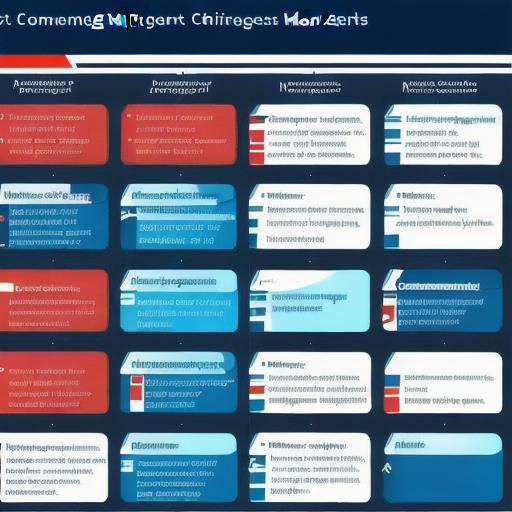Marketing is an essential component of any business, and it requires careful planning and execution to ensure its success. One of the most critical roles in marketing is that of a project manager. The responsibilities of a marketing project manager are diverse and require a range of skills and expertise. In this guide, we will explore the role of a marketing project manager, their responsibilities, and how to become one.
Introduction
Marketing project management involves planning, coordinating, and executing marketing campaigns to meet business objectives. A marketing project manager is responsible for overseeing all aspects of a marketing campaign, from ideation and planning to implementation and evaluation. They work closely with cross-functional teams, including marketers, designers, developers, and stakeholders, to ensure that the campaign runs smoothly and achieves its intended goals.
The Role of a Marketing Project Manager
A marketing project manager is responsible for several key tasks, including:
-
Campaign planning and strategy development
-
Budget management
-
Resource allocation
-
Risk management
-
Team leadership and coordination
-
Stakeholder management
-
Performance monitoring and evaluation
Campaign planning and strategy development
The first responsibility of a marketing project manager is to plan and develop marketing campaigns that align with business objectives. This involves understanding the target audience, identifying their pain points and needs, and developing a campaign strategy that addresses those issues. The marketing project manager must also work closely with stakeholders, including marketers, product managers, and executives, to ensure that the campaign is aligned with the overall business strategy.
Budget management
Marketing campaigns can be expensive, and budget management is a critical responsibility of a marketing project manager. They are responsible for allocating resources effectively, ensuring that costs remain within the allocated budget, and identifying areas where cost savings can be made.
Budget management
requires strong financial acumen and attention to detail.
Resource allocation
A marketing project manager must allocate resources effectively to ensure that the campaign is executed successfully. This includes personnel, equipment, and materials. The marketing project manager must identify the skills and expertise required for each task and allocate resources accordingly. They also need to manage team members effectively to ensure that they are working efficiently and meeting project deadlines.

Risk management
Marketing campaigns can be risky, and a marketing project manager must identify potential risks and develop strategies to mitigate them. This involves developing contingency plans, identifying backup resources, and having a crisis management plan in place. The marketing project manager must also monitor the campaign regularly to identify any issues that may arise.
Team leadership and coordination

A marketing project manager is responsible for leading and coordinating cross-functional teams. They must ensure that team members are working together effectively, communicating clearly, and meeting deadlines. The marketing project manager must also provide guidance and support to team members, ensuring that they have the resources and expertise they need to execute their tasks successfully.
Stakeholder management
A marketing project manager must manage stakeholders effectively to ensure that all parties are aligned with the campaign’s goals. This includes managing relationships with executives, product managers, marketers, designers, and developers. The marketing project manager must also communicate effectively with stakeholders, ensuring that they understand the campaign’s progress and any issues that arise.
Performance monitoring and evaluation
A marketing project manager is responsible for monitoring the campaign’s performance regularly and evaluating its success against business objectives. They must identify key metrics and track progress against those metrics. The marketing project manager must also conduct post-campaign evaluations to identify areas where improvements can be made in future campaigns.
How to Become a Marketing Project Manager
To become a marketing project manager, you should have the following qualifications and experience:
- Education: A degree in marketing or a related field is preferred, but not required.
- Experience: At least 3-5 years of experience in marketing, preferably in a project management role.
- Skills: Strong project management skills, including the ability to plan and execute campaigns, manage resources, and monitor performance.
- Knowledge: A strong understanding of marketing principles, including campaign planning, target audience analysis, and market research.
- Certifications: Certification in project management or a related field is highly desirable.
Becoming a marketing project manager requires hard work, dedication, and attention to detail. It is essential to develop the necessary skills and knowledge through education, experience, and training.
Conclusion
Marketing project management is an essential component of any business, and a marketing project manager plays a critical role in ensuring its success. They are responsible for planning, coordinating, and executing marketing campaigns to meet business objectives. To become a successful marketing project manager, you must have strong project management skills, a deep understanding of marketing principles, and relevant experience.
FAQs
- What is the difference between a marketing manager and a marketing project manager?
A marketing manager focuses on developing and executing overall marketing strategies, while a marketing project manager focuses on managing specific campaigns to achieve business objectives.
- How do I develop my project management skills?
There are many resources available online, including courses, webinars, and certification programs, that can help you develop your project management skills. It is also essential to gain practical experience in project management through internships or entry-level positions.
- What software tools do I need as a marketing project manager?
There are many software tools available that can help you manage marketing campaigns, including project management software, marketing automation tools, and analytics platforms.
- How long does it take to become a marketing project manager?
The time it takes to become a marketing project manager depends on your level of experience and education. It may take several years to gain the necessary skills and knowledge through education, experience, and training.
Case Study: A Successful Marketing Campaign by a Project Manager
In this case study, we will explore a successful marketing campaign managed by a marketing project manager at XYZ Corporation. The campaign aimed to increase sales of their new product by 20% in six months.
- Campaign Planning and Strategy Development:
The marketing project manager conducted market research and identified that the target audience for the new product was busy professionals aged between 25-45 who valued convenience and quality. The marketing strategy focused on creating a campaign that highlighted the convenience and quality of the product, while also emphasizing its value for money.
- Budget Management:
The marketing project manager allocated a budget of $100,000 for the campaign, which included advertising, content creation, and events. They monitored expenses closely to ensure that they remained within the allocated budget.
- Resource Allocation:
The marketing project manager identified the skills and expertise required for each task and allocated resources accordingly. They hired a team of designers, developers, and copywriters to create the campaign’s content, while also leveraging existing resources within the organization.
- Risk Management:
The marketing project manager developed a contingency plan in case the campaign did not perform as expected. This included identifying alternative marketing channels and adjusting the budget if necessary. They also had a crisis management plan in place to address any issues that may arise during the campaign.
- Team Leadership and Coordination:
The marketing project manager led and coordinated the team effectively, ensuring that they communicated clearly and met deadlines. They provided guidance and support to team members, ensuring that they had the resources and expertise they needed to execute their tasks successfully.
- Stakeholder Management:
The marketing project manager managed stakeholders effectively, including executives, product managers, marketers, designers, and developers. They conducted regular meetings to ensure that all parties were aligned with the campaign’s goals and provided updates on the campaign’s progress.
- Performance Monitoring and Evaluation:
The marketing project manager monitored the campaign’s performance regularly and evaluated its success against business objectives. They identified key metrics, including sales, website traffic, and social media engagement, and tracked progress against those metrics. The campaign resulted in a 25% increase in sales of the new product within six months.
Conclusion
:
In this case study, we have seen how a marketing project manager at XYZ Corporation successfully managed a marketing campaign that achieved its business objectives. By focusing on planning and executing a campaign that met the needs of the target audience, allocating resources effectively, managing risks, leading and coordinating the team, managing stakeholders, and monitoring and evaluating performance, the marketing project manager was able to deliver a successful campaign that increased sales by 25%.




